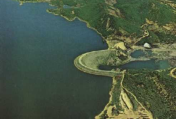Researchers: | Pieter van Oel |
| ||
Maarten Krol | ||||
Arjen Hoekstra | ||||
Organisations: | University of Twente | |||
Period: | Nov 2003 – Nov 2007 | Large strategic reservoir in the Jaguaribe basin | ||
Background
The impacts of global change emerge in a dynamic way. Societal impacts depend both on geophysical changes and on the regional/ local ability to respond to these changes. The impacts of global climate change materialise in regional contexts. Semiarid environments in densely populated developing regions are amongst the ones most vulnerable.
The central problem of water management in semiarid regions is to find appropriate strategies for water planning, steering of water supply and demand and water distribution of reservoir storage on a regional and local scale. These water management strategies must account for the unreliable rainwater supply, changing water demand and possibly negative future trends in water availability.
Objectives
The research objective is to understand the long-term effects of changes in water demand and the ongoing process towards participatory water management in an environment with high rainfall variability. Irrigation water demand patterns are emerging under influence of both individual farmer- common and political interests. For the purpose of modeling this complex system use is made of multi-agent simulation techniques in combination with GIS. The resulting simulation model facilitates for the evaluation of alternative water management policies and strategies on the river basin- / state scale.
In the case study area, data are gathered on system components and decision-making processes at different scales of the system. In this way complex dynamic water demand patterns can be explained. In cooperation with the ITC faculty in Enschede techniques related to GIS and remote are applied.

